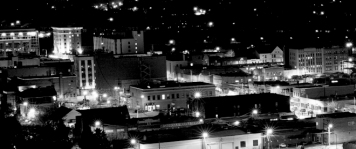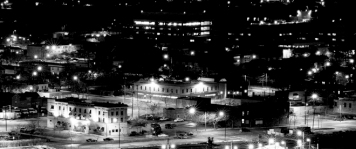Another Round
Regional alcohol distributer Summit Beverage is surviving the economic downturn by putting efficiency measures in place
Story by Jessa Linford

Chris Maples starts to fill a new order in the wine room that will be distributed by semi's that night to one of Summit Beverage's costumers between Polson and Darby.
Lights flick on as footsteps recede away, tracing the faint shuffling of feet on a brightly flooded path. As one foot crosses into the shadows, another bulb pops on, illuminating the next 20 feet of Summit Beverage’s warehouse. You move a few feet yourself, and the light behind you extinguishes.
The effects of the recession may be a bit delayed in Montana compared to the rest of the Union, but Summit Beverage is one step ahead of the game.
Last year, it installed energy efficient lighting and occupancy sensors.
This year, it dodged going into the red by saving in other places like recycling.
Summit Beverage commands the alcohol-distributing business from Darby to Polson. In January of 2010, the company registered its greatest loss in 12 months, but all year it has seen its volume drop as the recession has creept into Montana’s economy.
Brand manager Greg Markovich says it is primarily the bar and restaurant costumers that have dropped in volume.
This trend is different from the early 1990s recession, when people were going to the bars and restaurants to forget their problems. The reason, Markovich believes, are stricter DUI enforcement and anti-smoking laws.
“People are scared,” he says.
They don’t want to risk even a few beers at the bar when they can stop by the store and grab a six-pack. This has seemed to hurt local business in Missoula, but Summit Beverage’s costumers like Albertsons, Super One, and Rosauers have seen steady volume numbers.
Besided choosing stores over restaurants, people have gravitated from quantity to quality.
Markovich points out that a six-pack of micro-craft beer may only cost $10, while a whole case of budget beer costs $20. Even though you are getting more bang for your buck with the budget beer, people may only have that ten bucks in their pocket. It seems they’re ready to invest the money they have in a $6.99 six-pack of Bayern Dancing Trout rather than a $5.79 six-pack of Budweiser.
Although people are buying more expensive alcohol, they are actually spending less and drinking less. The pricier alcohol isn’t making up for the loss in volume.
Summit Beverage has had to adjust to these shifts on its operations side.
Every night a task force of eight sifts through three stacks of paper, each an inch tall. There is one for beer, one for wine and one for pop.
One page per order, one order at a time, one pallet per order.
At 9 p.m., the sleepy looking warehouse at the end of Broadway is humming with noise. The Super Bowl is just days away and stores are stocking their shelves with beverages of choice.
The stereo is blaring hard rock as the forklifts start zipping around, honking at tight corners where voices full of laughter and punch lines yell across Miller Light and Mike’s Hard Lemonade boxes.
Chris Maples has only been working for Summit Beverage a few months, but he knows his way around the warehouse almost by heart.
Maples, who stands at 6 feet 8 inches and is known to most simply as Tree, says that 14 hours of loading just “burns you out, and then the day shift shows up and helps you finish.” This meant on Monday staying until 5 a.m. to finish all the orders for Tuesday.

Forklifts help keep up the dizzying pace at Summit Beverage, where employees are expected to package 1,200 cases of beer, wine or pop in an eight-hour shift.
It isn’t always this busy and seasonal fluctuations result in layoffs in slower times. Knowing his position could be only temporary, Maples hopes to transition his hours with Summit Beverage to the daytime. By acquiring his commercial driving license he would have a more secure job and could operate the company’s distributing semi-trailers. Until then, he works hard at what he has.
There is a finesse to operating the forklifts that haul hundreds of pounds of bulky boxes. Corners are leaned into as centrifugal force pulls at the operator. Skill and grace are used to cut the time needed to fill orders.
It’s easy to imagine a case falling at this breakneck pace, which leads you to assume that a faintly sweet smell in the drafy building is beer, until you notice the cement beneath you is immaculate. Once you discount the columns of kegs and cans stacked to the ceiling, you realize that what you are smelling is in fact a subtle lemon scent. The distributing warehouse somehow stays impressively clean, despite its employees being expected to keep a hasty pace of 150 cases per hour.
When a pallet is finished and an order filled, it goes to the wrapper: a machine 15 feet tall, equipped with six-foot wide plastic wrap. A rope dangles overhead as the pallet is maneuvered into position. With a quick tug on the rope, the order is shrink-wrapped ten times more efficiently than with manpower.
On a busy summer night, 18,000 bottles of beer and wine are distributed to 1,922 customers. With every pallet filled, more cardboard and shrink wrap is used, which is why Summit Beverage recycles all the products it uses.
“It just pays to go green,” Markovich says.
The motion-sensor lights alone save Summit Beverage more than $30,000 a year and will pay for themselves in just under a year and a half.
Lights click on and off as you walk through the warehouse, like spotlights on a movie set.They follow the motion of the forklifts, and where there is no movement for a few minutes, corners are plunged into darkness until the next round.
About this entry
You’re currently reading “Another Round,” an entry on Night Vision
- Published:
- February 17, 2010 / 12:48 am
- Category:
- 9 p.m. to 12 a.m.
- Tags:
- Bars



No comments yet
Jump to comment form | comment rss [?]